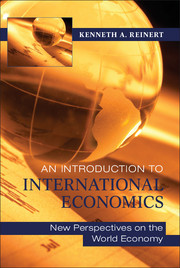Book contents
- Frontmatter
- Summary Contents
- Detailed Contents
- Preface
- Acknowledgments
- Acronyms
- Symbols
- 1 Windows on the World Economy
- I International Trade
- II International Production
- III International Finance
- 13 Accounting Frameworks
- 14 Exchange Rates and Purchasing Power Parity
- 15 Flexible Exchange Rates
- 16 Fixed Exchange Rates
- 17 The International Monetary Fund
- 18 Crises and Responses
- 19 Monetary Unions
- IV International Development
- Glossary
- Index
- References
17 - The International Monetary Fund
from III - International Finance
- Frontmatter
- Summary Contents
- Detailed Contents
- Preface
- Acknowledgments
- Acronyms
- Symbols
- 1 Windows on the World Economy
- I International Trade
- II International Production
- III International Finance
- 13 Accounting Frameworks
- 14 Exchange Rates and Purchasing Power Parity
- 15 Flexible Exchange Rates
- 16 Fixed Exchange Rates
- 17 The International Monetary Fund
- 18 Crises and Responses
- 19 Monetary Unions
- IV International Development
- Glossary
- Index
- References
Summary
In the history of global financial arrangements, the year 1941 stands as a turning point. In September of that year, the British economist John Maynard Keynes spent, as he wrote to his mother, “several days of peace writing a heavy memorandum on post-war international currency plans.” The result was a proposal for an International Clearing Union (ICU), an idea subsequently taken up by the British Treasury. Three months later and across the Atlantic, U.S. Treasury official Harry Dexter White wrote a proposal for an International Stabilization Fund (ISF), subsequently embraced wholeheartedly by U.S. Treasury Secretary Henry Morgenthau. These two proposals, which became known as the Keynes Plan and the White Plan, respectively, competed for prominence in the international deliberations over how to constitute the institutions of international finance after the end of the Second World War. The proposals were taken up at the Bretton Woods Conference in July 1944, with the White Plan gaining prominence. The result was the creation of the International Monetary Fund (IMF) and the International Bank for Reconstruction and Development (the World Bank). Neither Keynes nor White would live out the decade, both dying of heart attacks while the Fund and Bank were being established.
In Chapter 7, you were introduced to the institutions of international trade in the form of the World Trade Organization. As a student of the world economy, you also need to be familiar with the IMF and World Bank. This chapter introduces you to the IMF, and Chapter 23 introduces you to the World Bank. Together, these two chapters will make you familiar with the basic “rules of the game” in international finance. We begin in this chapter with a brief history of international monetary arrangements during the twentieth century. This will allow you to place the IMF in the context of recent financial history. Next we turn to the actual operations of the IMF and the political economy of IMF lending. Finally, we make a preliminary assessment of the IMF and its role in the world economy. We take up the controversial role of the IMF in recent financial crises in Chapter 18.
- Type
- Chapter
- Information
- An Introduction to International EconomicsNew Perspectives on the World Economy, pp. 283 - 306Publisher: Cambridge University PressPrint publication year: 2011



